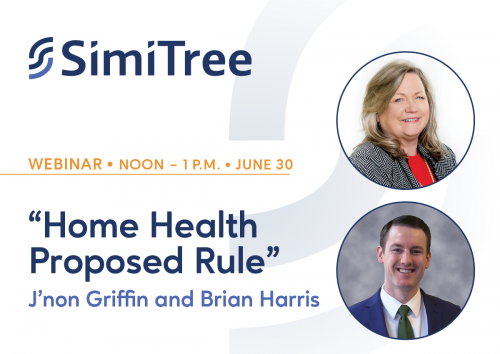Join SimiTree consultants for a June 30 webinar to learn more.
A proposed pay decrease for home health would drop Medicare’s base rate of pay per episode in 2023 to within $3 of the 2021 base payment, despite financial pressures such as soaring fuel costs, an ongoing labor shortage and the consumer index rising in May at the fastest rate since December 1981.
“Under this rule, the base payment in 2023 would be $1,904.76,” SimiTree Financial Consulting Director Mike Simione told the SimiTree Finance Regulatory Committee on Friday. “In 2021 it was $1,901.12.”
Simeone’s analysis was presented to SimiTree consultants gearing up to help agencies deploy new strategies to balance rising costs against tighter margins and navigate an increasingly challenging financial environment.
The proposed 4.2 percent pay decrease is expected to generate a loss of about $810 million for home health providers, they say.
The pay cut was outlined by the Centers for Medicare and Medicaid Services (CMS) in the proposed update to the Home Health Prospective Payment System for 2023.
“CMS issued the proposed rule just days after the U.S. Bureau of Labor Statistics reported the fastest rate of growth in the consumer price index in decades, rising 8.6 percent in May from a year ago,” Simione said.
Behavioral adjustment
The decrease in reimbursement set out in the rule is due largely to the implementation of a behavioral based payment reduction known as the behavioral adjustment, a methodology widely criticized by industry leaders.
The behavioral adjustment is statutorily required by the Bipartisan Budget Act of 2018. The Act requires a six-year monitoring period for the Patient Driven Grouping Model (PDGM), the new payment model implemented for Medicare in 2020, and calls for both temporary and permanent adjustments in payment to account for expected changes as agencies adapt to Medicare’s new payment model. The behavioral adjustment proposed for 2023 would be a permanent reduction of 7.69 percent to the 30-day payment rate.
Complimentary webinar
As part of SimiTree’s efforts to help providers insulate themselves against the anticipated decrease in reimbursement, Principal J'non Griffin and Financial Consulting Director Brian Harris will team up for a webinar Thursday, June 30, to review the financial implications of the proposed decrease and discuss strategies agencies should consider.
“Navigating the Home Health Proposed Rule and Its Impact on Your Agency,” a complimentary webinar, is set to begin at noon Eastern, and registration is available here.
During the webinar, Griffin and Harris will review other changes outlined in the proposed rule, including:
- CHANGES TO PDGM. The rule proposes extensive recalibration of PDGM case mix weights, including changes to some primary clinical groupings, functional levels, comorbidity adjustment subgroups, and LUPA thresholds.
- A NEW BASELINE YEAR FOR VBP. 2022 is proposed as the new baseline year for nationwide expansion of the Home Health Value Based Purchasing Model. Previously, CMS had planned to use 2019 as the baseline year. SimiTree consultants note that the first performance year for the model will not be affected by the change in baseline year and will still be 2023.
- WAGE INDEX CAP. The rule would impose a permanent 5 percent cap on any decrease to a geographic area's wage index from its wage index in the previous year, regardless of the circumstances causing the decline. This proposal mirrors a similar hospice proposal. SimiTree consultants say it would help home health agencies more effectively budget and plan their operations.
- TELEHEALTH REPORTING. Beginning in 2023, CMS would require agencies to report all telehealth visits on claims with new G codes for reporting by discipline. Reporting would be voluntary for six months, from January to July, and would become mandatory in July 2023. SimiTree consultants note that although reporting will become mandatory, no reimbursement will be allowed.
- ALL PAYER OASIS POLICY. CMS wants to require agencies to submit OASIS data for all patients, regardless of payer, and not just for Medicare or Medicaid patients. The change would be required for the purposes of the Home Health Quality Reporting Program. Although reporting would not begin until 2025, SimiTree consultants say time frames for the collection of information would require completion of OASIS assessments for patients discharged in 2024. As part of a phased in implementation, expanded reporting of assessment-based quality measure data and standardized patient data would first be required for patients discharged between Jan. 1, 2024, and June 30, 2024.
SimiTree can help
The financial experts at SimiTree can make a difference to the bottom line at your organization. We work with home health and hospices of all sizes to streamline processes, improve efficiencies, and achieve sustainable profitability. Use the form below to reach out to us today.

